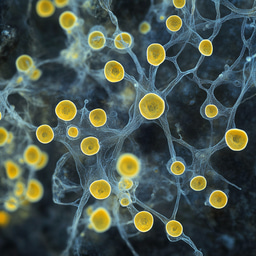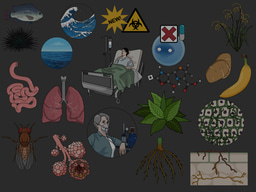Do bacteria and protozoa communicate with oxylipins?
Published in Microbiology
Almost all kingdoms of multicellular eukaryotes synthesize oxylipins – oxidized PUFA derivatives. They include prostaglandins and leukotrienes in humans, jasmonates in plants, precocious sexual inducer (psi) factors in fungi and hydrocarbon pheromones in some algae. So, thay are universal cell-to-cell signalling mediators in eukaryotes. Thay are also present in microbes, but the fuctions of microbial oxylipins are poorly characterized.
We used a conserved enzyme lipoxygenase to 'track' oxylipin signalling evolution through the life history. We found, that it is primarily associated with multicellularity emergences in differenct taxa, even in microbes. It leads to an assumption, that bacteria could invent the oxylipin 'language' and then give it to some groups of eukaryotes by horizontal gene transfer. But some bacteria have learnt to use oxylipins for cross-kingdom pathogenicity by counterfeiting host's immune system signalling. This group of oxylipin 'evil-makers' includes Pseudomonas aeruginosa, whose oxylipins have shown a pathogenic role in several experiments.
Our findings are summarized in a graphical from at this poster. For more information, please read our article in Biochemistrty (Moscow) where we have described our evolutionary reconstructions in detail.
Compared to our paper, here we have speculated a little about the similarity between the oxylipin signalling evolution and the programmed cell death evolution. It is a really striking similarity, that we hope to explain in our further publications. We will return to this topic in a 'Behind the Paper' story post that is coming soon.
This poster was presented at the Research Poster Competition 2021 of the Royal Society of Biology.
References
- Kurakin, G.F., Samoukina, A.M. & Potapova, N.A. Bacterial and Protozoan Lipoxygenases Could be Involved in Cell-to-Cell Signaling and Immune Response Suppression. Biochemistry Moscow, 85, 1048–1063 (2020). https://doi.org/10.1134/S0006297920090059
- Morello, E., Pérez-Berezo, T., Boisseau, C., Baranek, T., Guillon, A., Bréa, D., ... & Si-Tahar, M. (2019). Pseudomonas aeruginosa lipoxygenase LoxA contributes to lung infection by altering the host immune lipid signaling. Frontiers in microbiology, 10, 1826. https://doi.org/10.3389/fmicb.2019.01826
- Lane, N. (2008). Marine microbiology: origins of death. Nature News, 453(7195), 583-585. https://doi.org/10.1038/453583a






Please sign in or register for FREE
If you are a registered user on Research Communities by Springer Nature, please sign in